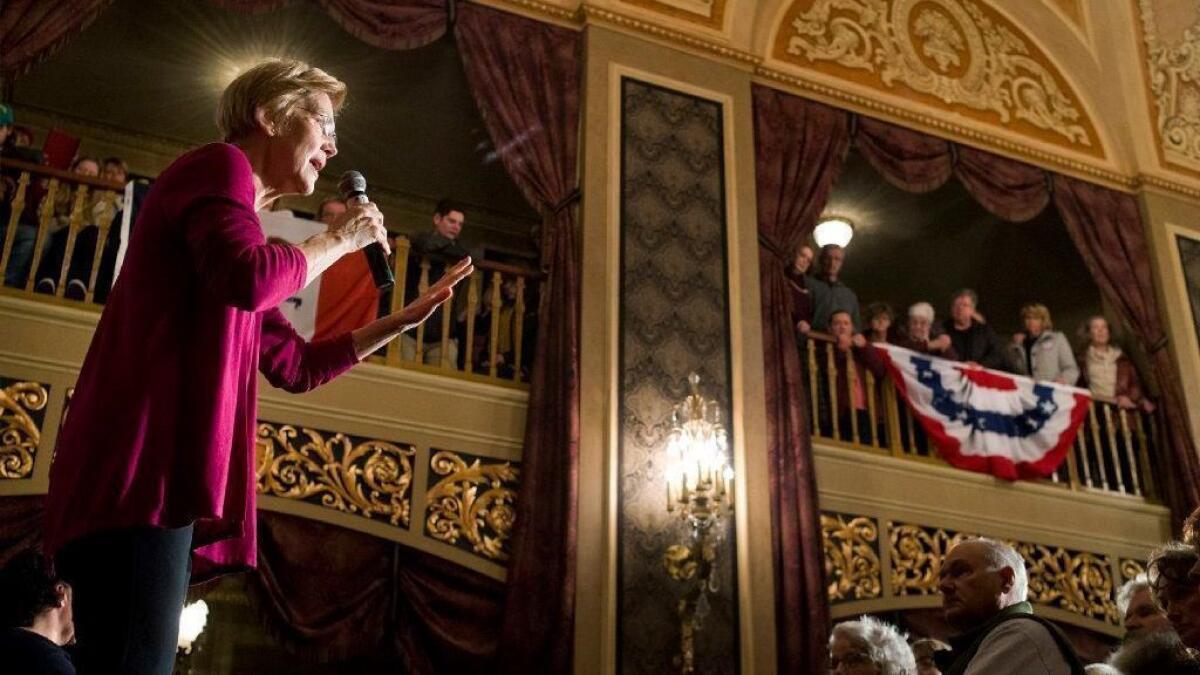They’re off and running: Elizabeth Warren’s trip to Iowa launches Democrats’ long race to take on Trump

- Share via
Reporting from Council bluffs, iowa — Marylynn Leggio nodded excitedly as Massachusetts Sen. Elizabeth Warren, pumping her fist from the small stage in a cramped room adjoining a western Iowa bowling alley, breathlessly excoriated billionaires and lobbyists.
“I’m not ready to commit, but she was on fire,” said Leggio, one of 300 people who made it inside to get a first look at the newest Democratic presidential candidate. Two hundred others stood outside waiting in the cold.
Leggio, a 71-year-old retiree, was shopping early for a 2020 candidate with her teenage granddaughter Maggie Bashore. She displayed the well-founded confidence of a resident of Iowa — the state with the first presidential nominating contest — that she would get an opportunity to personally poke and prod every aspirant in a Democratic field that could grow to more than 20 contenders eager to take on President Trump.
“There are a lot of questions I’d like to ask, but she’ll be back,” Leggio said.
The Iowa party caucuses are more than a year away, but this weekend marked the unofficial start of the 2020 presidential campaign season. Warren on Monday became the first of the big-name candidates to form a presidential exploratory committee and then made an immediate foray to Iowa on Friday, scheduling five stops over three days across the farm state.
Since Warren began planning to run for president over the last few months, the national spotlight has been harsh. Like candidates before her, she’s counting on the locals here to discount the skeptics and make up their own minds.
Critics, including many Democrats, have questioned whether Warren is too far to the left, too damaged by the controversy over her thin claims to Native American ancestry or incapable of connecting with average Americans.
Her advisors see Iowa, where candidates audition before informal groups of party activists and curious voters, as an ideal place for her to prove the detractors wrong and remind the political class what made her such a formidable candidate in the first place.
Eight years ago, she made a name for herself in precisely this type of environment — dazzling small groups of Democratic Party activists in Massachusetts house parties when she was preparing for an eventual Senate campaign. One moment captured on video, when she explained why she thinks businesses and wealthy people should pay more taxes, went viral and helped cement her reputation with the party’s left wing.
Voters who show up to the early events here tend to be receptive but noncommittal — and, occasionally, tough inquisitors.
One woman at an event in Council Bluffs tried to get Warren to oppose legalized abortion, which Warren, long a strong supporter of abortion rights, declined to do. Another in Sioux City asked why she released her DNA test in October, giving the president — who calls Warren “Pocahontas” — “more fodder to be a bully” in mocking her claims to Native American heritage. Others asked whether she supports net neutrality, how she could win over moderate Republicans who dislike Trump, and whether she had done enough in the Senate to justify a White House run.
Warren gamely took selfies with dozens of people at each event, and kept talking when the sound system in Council Buffs conked out for a few minutes. By Saturday morning, her voice was growing hoarse from a head cold, though she continued to bounce around the crowd.
She stuck to a rehearsed answer on the Native American question, repeating that her background came from family stories “like a lot of folks” have in her native Oklahoma, and that she was not claiming to be a member of a tribe or a person of color. (She had, in fact, previously listed herself as a minority in a national law directory, though a review by the Boston Globe found the issue was not a factor in her hiring as a law professor at Harvard University and elsewhere.)
“I’m just gonna put it all out there,” Warren said of her law school hiring records and DNA test, both of which are now online.
“I can’t stop Donald Trump from what he’s gonna do,” she said. “I can’t stop him from hurling racial insults.
“But what I can do,” she added, “is I can be in this fight for all of our families.”
Warren insisted that she was glad to get the question. Yet the issue continues to be among the sorest points in her political career. She was more eager to talk about other aspects of her biography, including the time her mother temporarily supported the family with a minimum-wage job, and the inexpensive college education that did not plunge Warren into debt. Though Warren is a senator and a former professor at the nation’s most elite university and has written dense textbooks on bankruptcy law, she salted her public speeches with tales of “momma,” “daddy” and “folks,” frequently dropping consonants at the end of her words to highlight her Oklahoma roots.
“Today, a minimum wage job in America — full time — will not keep a momma and a baby out of poverty and it is wrong and it is why I’m in this fight,” she said.
In keeping with her familiar populism, Warren was also keen to lambaste oil companies, drug manufacturers and financial giants, who she said control Washington at the expense of working Americans.
Many who came to see Warren four years ago supported Vermont Sen. Bernie Sanders, a like-minded independent, for the Democratic nomination. Some said they were ready to move on, even if he enters the race. Though many voters here are checking out Warren, they are also mentioning other potential candidates, including former Vice President Joe Biden, former Rep. Beto O’Rourke of Texas, Minnesota Sen. Amy Klobuchar, New Jersey Sen. Cory Booker and Sen. Kamala Harris of California.
“We’re hoping to get some better candidates this election,” said Shauna Buckingham, a 28-year-old production supervisor from Cherokee who came to an event with her baby, Joshua.
“It wasn’t too impressive last time around,” said Chad Jorgensen, her boyfriend.
Though some voters here lament the seemingly never-ending campaign cycle, there is a thirst among many Democratic activists to begin the vetting process, given their zeal to defeat Trump.
“We’re going to pay attention. It’s not going to happen again,” said Jane Reynolds, a retiree from Sioux Falls, bitterly recalling 2016 nominee Hillary Clinton’s loss.
“If we are going to have 20 people, we may as well get started,” said Jeff Fossum, a 63-year-old retiree who wore a button that said “It’s Mueller Time” — using the beermaker’s logo to evoke Robert S. Mueller III, the special counsel investigating Trump associates’ potential role in Russian interference in the 2016 election.
Teri Copple, a 56-year-old mental health specialist, said the long primary season gives voters a chance to see whether candidates “change their tempo and how they handle the long haul” and react to dynamic world events. “Questions are going to get harder,” she said. “Emotions are going to get stronger.”
Warren, who was known for avoiding impromptu questions from Senate reporters, is responding to reporters at most stops here. Her answers, however, are not always responsive. On Friday night, she refused to say whether Democrats should condemn Rep. Rashida Tlaib, a newly elected Democrat from Michigan who used profane language in vowing to impeach Trump.
Warren was more willing to take an indirect shot at a couple of wealthy potential rivals for the Democratic nomination, Tom Steyer and Michael R. Boomberg, who are likely to self-fund their campaigns should they run.
“Campaigns should not be for sale,” she said, arguing that Democrats should base their efforts on the grass roots — “not having billionaires buy these campaigns.”
Political professionals expect Warren’s move toward a full-blown presidential run to spark a rush of competition in coming weeks. She has already hired some of the most experienced political operatives in Iowa and has staffers collecting contact information from the people who have lined up to see her, to build a volunteer file.
“She has forced everybody’s hand,” said Mary Anne Marsh, a Democratic strategist and former advisor to former senator and 2004 presidential nominee John F. Kerry. “If I’m Bernie Sanders at this point, or anyone including Beto, I think you need to get in sooner than later. People are looking. People are already talking about it. Elizabeth Warren is traveling.”
Her early start and Democrats’ anticipated large field also increases the chances that candidates will trade places in its top tier — much as Trump quickly upended the expected front-runners in Republicans’ crowded contest four years ago. Warren was a favorite of the left then, with people begging her to run. The enthusiasm seems muted now that she’s in.
David Axelrod, the longtime political advisor to President Obama, cautioned against reading too much into quick judgments or early setbacks of the candidates.
He said Warren can sound stilted and inauthentic, and he criticized her handling of the heritage issue. But, Axelrod added, she could well become the nominee, given her “genuine claim to the populist base in the party that is really second to none.”
Follow the latest news of the Trump administration on Essential Washington »
Twitter: @noahbierman
More to Read
Get the L.A. Times Politics newsletter
Deeply reported insights into legislation, politics and policy from Sacramento, Washington and beyond. In your inbox three times per week.
You may occasionally receive promotional content from the Los Angeles Times.











